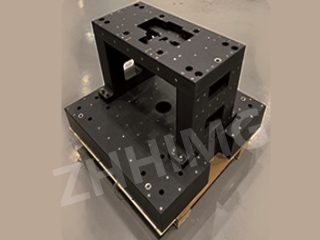Automation technology has advanced significantly in recent years, and this has led to the development of many innovative products that require reliable and durable machine parts. When it comes to selecting materials for these parts, there are various options available, including metal and granite. While both materials have their advantages, granite has proven to be a better option for automation technology products for many reasons.
One of the primary reasons why granite is preferred over metal is its unmatched structural stability and resistance to wear and tear. Industrial equipment and machinery can be subjected to extreme conditions, including high heat, corrosive materials, and high pressure. Granite has a unique resistance to these conditions, making it an ideal material for applications where durability is essential. For instance, in automated machine components such as motors, the use of granite significantly reduces the risk of wear, ensuring that the machine operates at optimal efficiency, thereby increasing productivity.
Granite has a high level of thermal stability, and this makes it an ideal choice for automation technology products that require precision. Many industrial devices come with electronic components that require stable temperatures to operate optimally. When temperature variations occur, it can cause the machines to break down. Unlike metal, which is prone to thermal expansion and may cause parts to warp, granite remains stable over a wide range of temperatures, making it an ideal option for precision components.
Another significant advantage of using granite in automation technology products is its superior vibration dampening capabilities. Industrial machines can produce significant amounts of vibration during operation, which, if not controlled, can result in expensive equipment damage and downtime. Granite has excellent vibration dampening properties, which reduces vibration noise, ensuring that components such as bearings, shafts and other parts operate smoothly and are not affected by machine vibrations.
Lastly, granite is a non-magnetic material that makes it ideal for automation technology products that require non-magnetic components. Metal parts may sometimes have magnetic properties that can interfere with electronic devices, compromising their precision and accuracy. The non-magnetic properties of granite make it ideal for the manufacture of sensitive components, and this reduces the risk of interference, ensuring that the machines perform at optimal efficiency.
In conclusion, with the increasing demand for automation technology products to meet the rapid change in production demands, choosing the right material for machine components is critical. The advantages of using granite make it the perfect material for automation technology products. With superior stability, temperature resistance, vibration-dampening properties, and non-magnetic attributes, granite provides an unmatched solution for automation technology products.
Post time: Jan-08-2024

